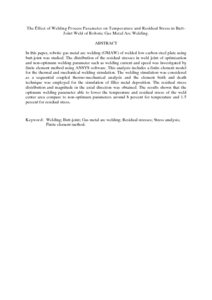Citation
Abdul Aziz, Nuraini and Mohamed Ariff, Azmah Hanim and Shah Mattar, Zainal Abidin
(2013)
The Effect of Welding Process Parameter on Temperature and Residual Stress in Butt-Joint Weld of Robotic Gas Metal Arc Welding.
Australian Journal of Basic and Applied Sciences, 7 (7).
pp. 814-820.
ISSN 1991-8178
Abstract
In this paper, robotic gas metal arc welding (GMAW) of welded low carbon steel plate using butt-joint was studied. The distribution of the residual stresses in weld joint of optimization and non-optimum welding parameter such as welding current and speed was investigated by finite element method using ANSYS software. This analysis includes a finite element model for the thermal and mechanical welding simulation. The welding simulation was considered as a sequential coupled thermo-mechanical analysis and the element birth and death technique was employed for the simulation of filler metal deposition. The residual stress distribution and magnitude in the axial direction was obtained. The results shown that the optimum welding parameter able to lower the temperature and residual stress of the weld center area compare to non-optimum parameters around 8 percent for temperature and 1.5 percent for residual stress.
Download File
![[img]](http://psasir.upm.edu.my/28568/1.hassmallThumbnailVersion/The%20Effect%20of%20Welding%20Process%20Parameter%20on%20Temperature%20and%20Residual%20Stress%20in%20Butt.pdf)  Preview |
|
PDF (Abstract)
The Effect of Welding Process Parameter on Temperature and Residual Stress in Butt.pdf
Download (84kB)
| Preview
|
|
Additional Metadata
Actions (login required)
 |
View Item |

